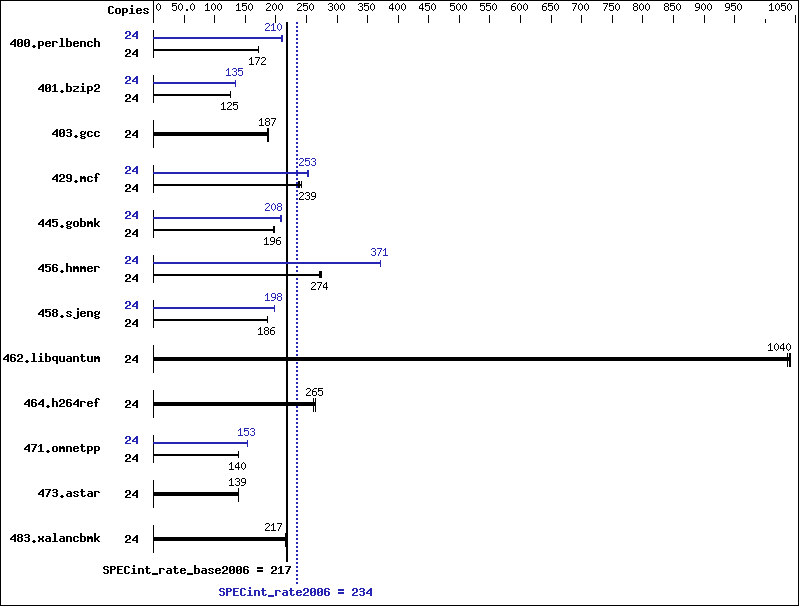| CPU2006 license: | 55 | Test date: | May-2011 |
|---|---|---|---|
| Test sponsor: | Dell Inc. | Hardware Availability: | Apr-2011 |
| Tested by: | Dell Inc. | Software Availability: | Jan-2011 |

| Hardware | |
|---|---|
| CPU Name: | Intel Xeon E7-2803 |
| CPU Characteristics: | |
| CPU MHz: | 1733 |
| FPU: | Integrated |
| CPU(s) enabled: | 12 cores, 2 chips, 6 cores/chip, 2 threads/core |
| CPU(s) orderable: | 2,4 chips |
| Primary Cache: | 32 KB I + 32 KB D on chip per core |
| Secondary Cache: | 256 KB I+D on chip per core |
| L3 Cache: | 18 MB I+D on chip per chip |
| Other Cache: | None |
| Memory: | 256 GB (32 x 8 GB 4Rx8 PC3L-8500R-7, ECC, running at 800 MHz) |
| Disk Subsystem: | 1 x 146 GB 15000 RPM SAS |
| Other Hardware: | None |
| Software | |
|---|---|
| Operating System: | SUSE Linux Enterprise Server 11 SP1 (x86_64), Kernel 2.6.32.12-0.7-default |
| Compiler: | Intel C++ Compiler XE for applications running on IA-32 Version 12.0.1.116 Build 20101116 |
| Auto Parallel: | No |
| File System: | ext3 |
| System State: | Run level 3 (multi-user) |
| Base Pointers: | 32-bit |
| Peak Pointers: | 32/64-bit |
| Other Software: | Microquill SmartHeap V9.01 |
Results Table
| Benchmark | Base | Peak | ||||||||||||
|---|---|---|---|---|---|---|---|---|---|---|---|---|---|---|
| Copies | Seconds | Ratio | Seconds | Ratio | Seconds | Ratio | Copies | Seconds | Ratio | Seconds | Ratio | Seconds | Ratio | |
| Results appear in the order in which they were run. Bold underlined text indicates a median measurement. | ||||||||||||||
| 400.perlbench | 24 | 1364 | 172 | 1362 | 172 | 1360 | 172 | 24 | 1116 | 210 | 1111 | 211 | 1118 | 210 |
| 401.bzip2 | 24 | 1848 | 125 | 1845 | 125 | 1847 | 125 | 24 | 1718 | 135 | 1718 | 135 | 1723 | 134 |
| 403.gcc | 24 | 1034 | 187 | 1028 | 188 | 1032 | 187 | 24 | 1034 | 187 | 1028 | 188 | 1032 | 187 |
| 429.mcf | 24 | 918 | 239 | 906 | 242 | 922 | 237 | 24 | 866 | 253 | 868 | 252 | 866 | 253 |
| 445.gobmk | 24 | 1281 | 196 | 1274 | 198 | 1282 | 196 | 24 | 1213 | 208 | 1208 | 208 | 1208 | 208 |
| 456.hmmer | 24 | 827 | 271 | 814 | 275 | 818 | 274 | 24 | 603 | 371 | 602 | 372 | 603 | 371 |
| 458.sjeng | 24 | 1562 | 186 | 1563 | 186 | 1562 | 186 | 24 | 1464 | 198 | 1465 | 198 | 1463 | 198 |
| 462.libquantum | 24 | 477 | 1040 | 480 | 1040 | 478 | 1040 | 24 | 477 | 1040 | 480 | 1040 | 478 | 1040 |
| 464.h264ref | 24 | 2004 | 265 | 2025 | 262 | 2005 | 265 | 24 | 2004 | 265 | 2025 | 262 | 2005 | 265 |
| 471.omnetpp | 24 | 1075 | 140 | 1075 | 140 | 1074 | 140 | 24 | 977 | 153 | 976 | 154 | 978 | 153 |
| 473.astar | 24 | 1210 | 139 | 1214 | 139 | 1211 | 139 | 24 | 1210 | 139 | 1214 | 139 | 1211 | 139 |
| 483.xalancbmk | 24 | 765 | 217 | 760 | 218 | 762 | 217 | 24 | 765 | 217 | 760 | 218 | 762 | 217 |
Submit Notes
The config file option 'submit' was used. numactl was used to bind copies to the cores
Operating System Notes
'ulimit -s unlimited' was used to set the stacksize to unlimited prior to run 'mount -t hugetlbfs nodev /mnt/hugepages' was used to enable large pages echo 10800> /proc/sys/vm/nr_hugepages export HUGETLB_MORECORE=yes export LD_PRELOAD=/usr/lib64/libhugetlbfs.so
Platform Notes
BIOS Settings: Power Management = Maximum Performance (Default = Active Power Controller)
General Notes
Binaries were compiled on RHEL5.5
Base Portability Flags
| 400.perlbench: | -DSPEC_CPU_LINUX_IA32 |
| 462.libquantum: | -DSPEC_CPU_LINUX |
| 483.xalancbmk: | -DSPEC_CPU_LINUX |
Base Optimization Flags
C benchmarks:
| -xSSE4.2 -ipo -O3 -no-prec-div -opt-prefetch -B /usr/share/libhugetlbfs/ -Wl,-hugetlbfs-link=BDT |
C++ benchmarks:
| -xSSE4.2 -ipo -O3 -no-prec-div -opt-prefetch -Wl,-z,muldefs -L/smartheap -lsmartheap -B /usr/share/libhugetlbfs/ -Wl,-hugetlbfs-link=BDT |
Peak Compiler Invocation
C benchmarks (except as noted below):
| icc -m32 | |
| 400.perlbench: | icc -m64 |
| 401.bzip2: | icc -m64 |
| 456.hmmer: | icc -m64 |
| 458.sjeng: | icc -m64 |
C++ benchmarks:
| icpc -m32 |
Peak Portability Flags
| 400.perlbench: | -DSPEC_CPU_LP64 -DSPEC_CPU_LINUX_X64 |
| 401.bzip2: | -DSPEC_CPU_LP64 |
| 456.hmmer: | -DSPEC_CPU_LP64 |
| 458.sjeng: | -DSPEC_CPU_LP64 |
| 462.libquantum: | -DSPEC_CPU_LINUX |
| 483.xalancbmk: | -DSPEC_CPU_LINUX |
Peak Optimization Flags
C benchmarks:
C++ benchmarks:
| 471.omnetpp: | -xSSE4.2(pass 2) -prof-gen(pass 1) -ipo(pass 2) -O3(pass 2) -no-prec-div(pass 2) -prof-use(pass 2) -ansi-alias -opt-ra-region-strategy=block -Wl,-z,muldefs -L/smartheap -lsmartheap |
| 473.astar: | basepeak = yes |
| 483.xalancbmk: | basepeak = yes |
